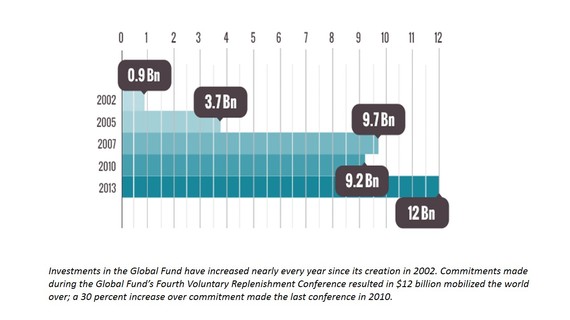With the holidays behind us, returning to our day-to-day lives may almost seem anticlimactic. For those of us working in global health, however, New Year's festivities started early and the excitement is likely to continue well into 2014. On December 3, the Global Fund to Fight AIDS, Tuberculosis and Malaria announced that it had mobilized an unprecedented commitment of $12 billion from donors. The conference at which this announcement was made -- the launch of the Global Fund's Fourth Voluntary Replenishment -- provided not only a time to celebrate, but also an opportunity to anticipate more progress saving lives in the months ahead.
The Global Fund is the world's largest public health financier, supporting programs that save 100,000 lives per month. Created in 2002 to help provide resources to win the battle against the three diseases, which were collectively killing 6 million people annually, the Global Fund now provides:
•More than 20 percent of global funding for HIV/AIDS
•More than 50 percent of international financing for malaria
•The overwhelming majority of international funding for tuberculosis
At the Global Fund's replenishment conference in December, donors from around the world made financial commitments that will span the next three years, from 2014-2016. The $12 billion raised was the largest amount ever committed to fight the three diseases. It marked a 30 percent increase over the $9.2 billion secured during the Global Fund's last replenishment in 2010 and was a result of the generosity of 25 donor countries, as well as corporations and foundations, high-net-worth individuals and faith-based organizations. In addition, many implementing countries -- those receiving grants from the Global Fund -- pledged to increase their own resources, adding further fuel to the fight.
Dr. Mark Dybul, Executive Director of the Global Fund, characterized the meeting as not only a replenishment of financial resources but also a replenishment of hope, saying, "The 21st Century ideals that led to the founding of the Global Fund are now stronger than ever: partnership, shared responsibility and mutual accountability."
The hope Dr. Dybul referred to is evidenced by the remarkable progress made in the past 20 years. In that time, tuberculosis deaths have decreased by more than 40 percent. In the past decade alone, HIV incidence is down by 33 percent and cases of malaria have dropped by 26 percent. Today, the end of these diseases is truly within sight.
Here in the United States, we were thrilled at the level of commitment to Replenishment. Of course, the U.S. government has been the largest contributor to the Global Fund since it was established. The announcement by President Obama that the U.S. will commit $1 for every $2 matched by other donors worldwide -- up to $5 billion -- was further illustration of this leadership. It also marks a potential $1 billion increase from the Administration's previous pledge to the Global Fund for the 2010-2013 timeframe.
Notwithstanding this very successful pledging moment, the replenishment conference marked only the beginning of a rolling, three-year campaign to raise funds. The Global Fund will continue to work with donors and partners in its efforts to defeat AIDS, tuberculosis and malaria. Nafsiah Mboi, Chair of the Board of the Global Fund, who led the pledging session, put it this way: "We've had a terrific beginning. Now let's go to work."
In the years ahead, the Global Fund will deepen its work with donor governments; encourage increased private sector and high-net-worth individual investments, as well as domestic co-financing; and work to ensure treatment, prevention and care continue to reach those most in need. But this current moment is certainly one to celebrate -- the beginning of a New Year in which our collective resolution is to control these three diseases once and for all. And, with replenishment efforts already well underway and increasing levels of support for the Global Fund worldwide, this is one resolution that we can hope to keep.
